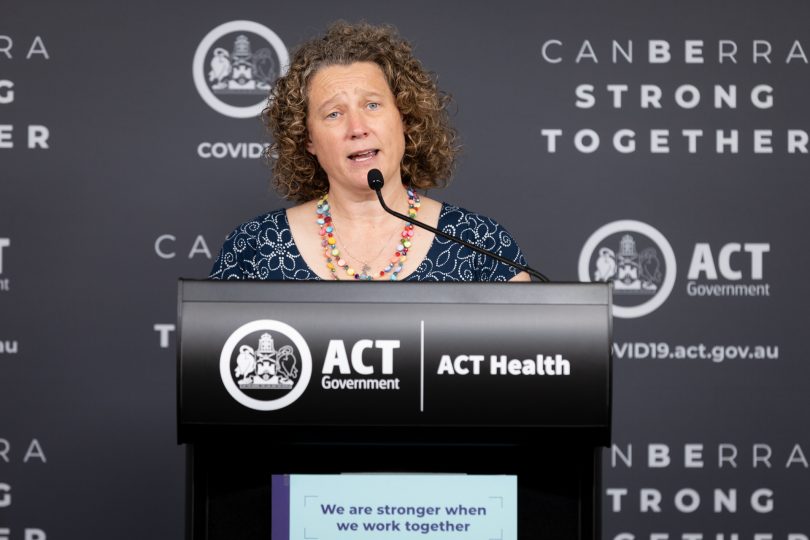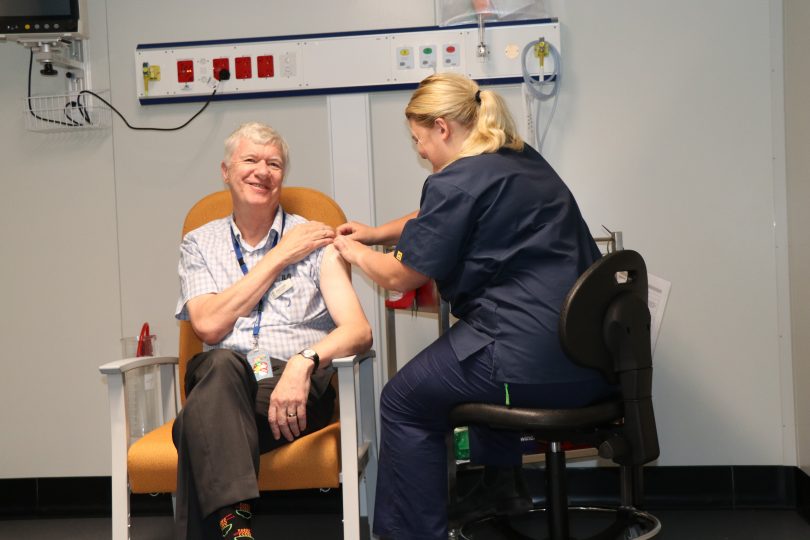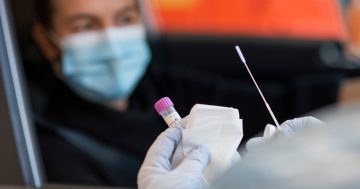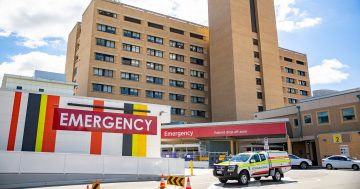
ACT Chief Health Officer Dr Kerryn Coleman. Photo: Michelle Kroll.
The ACT has recorded one new case of COVID-19 on the same day that the first doses of the AstraZeneca vaccine started rolling out in the Territory.
The man is under the age of 20 and is a family member of two other cases. All three are in quarantine together in a separate area of the hotel from the other repatriated Australians who landed in Canberra from Singapore last week.
There are now five active cases in the ACT, all of whom arrived on the flight and are in hotel quarantine.
Mandatory quarantine has also been extended for around a dozen people from the repatriation flight after their exposure to positive COVID-19 cases on the flight, and from family members once in hotel quarantine.
Two cases have been confirmed to have the more transmissible South African strain of the virus. Genomic testing to determine the virus strain of two other cases is due this afternoon and the new case has been tested with the results expected to arrive on Friday morning.
Health authorities believe the remaining three tests are likely the same strain of the virus as the first two travellers.
ACT Chief Health Officer Dr Kerryn Coleman said it is possible some of the repatriated Australians who are currently in hotel quarantine would return a positive test after the 14-day quarantine period.
“The most likely case, where we will see a day 15 or day 16 case, is for someone who is a close contact of one of these newer cases,” she said.
“There are several family groups and it is highly likely that a member of these family groups who was exposed on a day after the flight will therefore potentially test positive beyond the 14 days.
“What that means is those people will have an extended quarantine period beyond the 14 days because they need to quarantine for 14 days from their exposure.”
Dr Coleman said she is confident the ACT’s quarantine program is robust enough to handle the more transmissible strain after quarantine workers were advised to avoid large crowds and gatherings in light of the tests.
The South African COVID-19 strain can be anywhere between 30 and 40 per cent, and up to 70 per cent, more transmissible than other strains of the virus, depending on the specific strain and the circumstances within a given population, said Dr Coleman.

Both AstraZeneca and Pfizer vaccines are being rolled out from the COVID-19 Surge Centre in Garran, opposite Canberra Hospital. Photo: Dominic Giannini.
“Some of the evidence is showing that some of these variants of concern may have increased transmission properties and characteristics [but] it is really difficult at the moment to determine how much impact that has on Australia and on the viruses in the ACT,” she said.
“One of the reasons we went out to the staff is because we did have four cases appear and we were concerned there was some transmission on the flight … [so we] did advise that they reduce their risk while we were still investigating.
“We are putting all of our risk mitigation measures in place as fast and as thoroughly as we can.”
Concerns were raised about returning Australians testing positive after leaving quarantine when a Wollongong resident tested positive for the virus on day 16, in early February, two days after they left quarantine.
The results of genomic tests from the third and fourth cases will come back on the same day the ACT begins its rollout of the AstraZeneca vaccine, 10 March – the second COVID-19 vaccine approved for distribution in Australia after Pfizer.
Both the Pfizer and AstraZeneca vaccines will be rolled out from the COVID-19 Surge Centre in Garran, opposite Canberra Hospital, which has now been closed as a testing facility.

Dr Paul Craft was one of the first people in the ACT to receive the AstraZeneca vaccine. Photo: Supplied.
Around 250 people are expected to be vaccinated with the AstraZeneca vaccine this week, and this will increase to around 1000 people next week, said Canberra Health Services CEO Bernadette McDonald.
A further 2000 people will be vaccinated with the Pfizer vaccine during the next two weeks. Around 2500 Canberrans have already received the Pfizer jab since the rollout began on 22 February.
Ms McDonald said the ACT is working up to being able to administer 6000 doses a week, depending on supply.
The second phase – phase 1B – is expected to begin on 22 March and will include adults above the age of 70, Indigenous people above the age of 55, adults with an underlying health condition, and critical and high-risk workers.
Adults under the age of 50 will be the last people to receive the vaccine, and they will be eligible to receive the jab from July 2021.
For further information on the ACT Government’s response to COVID-19 and the vaccine rollout in the Territory, visit here.

















